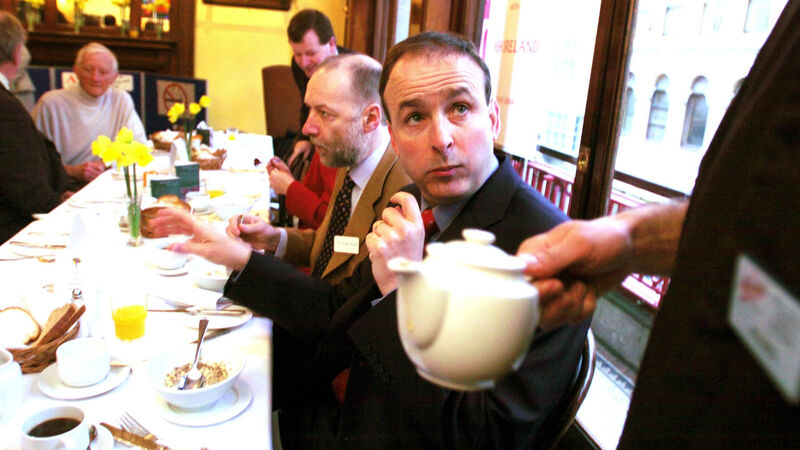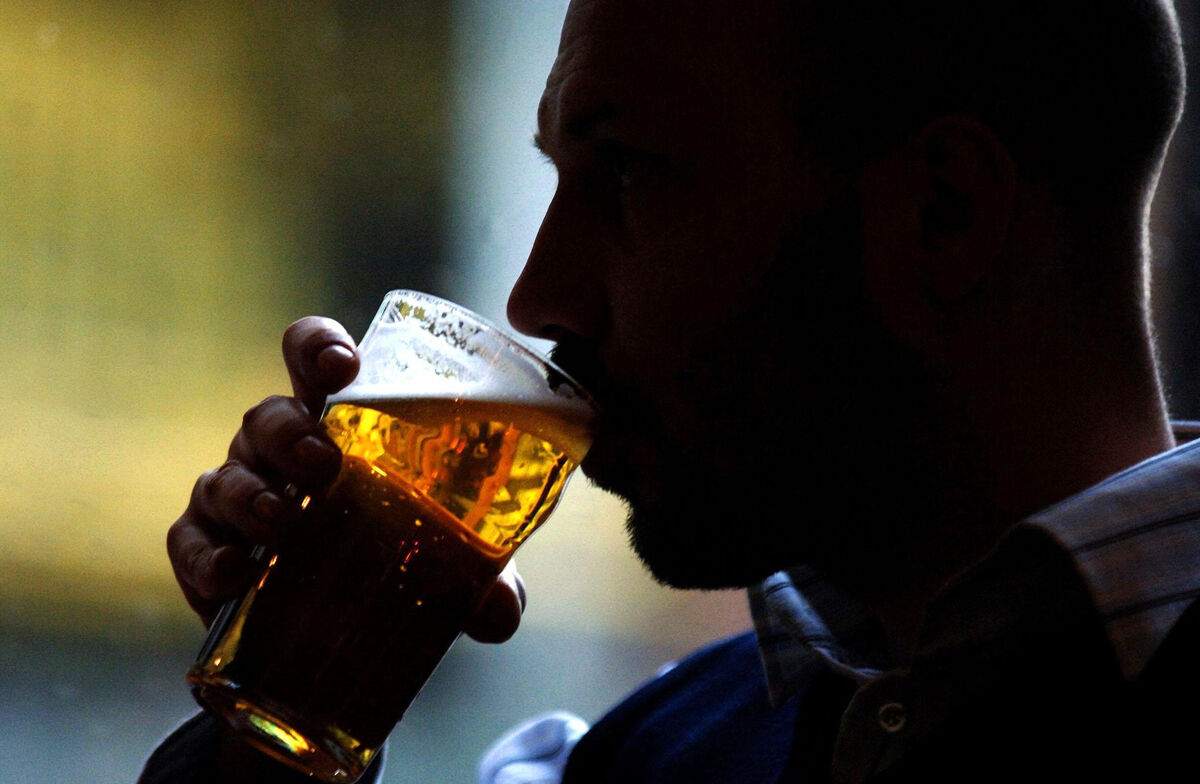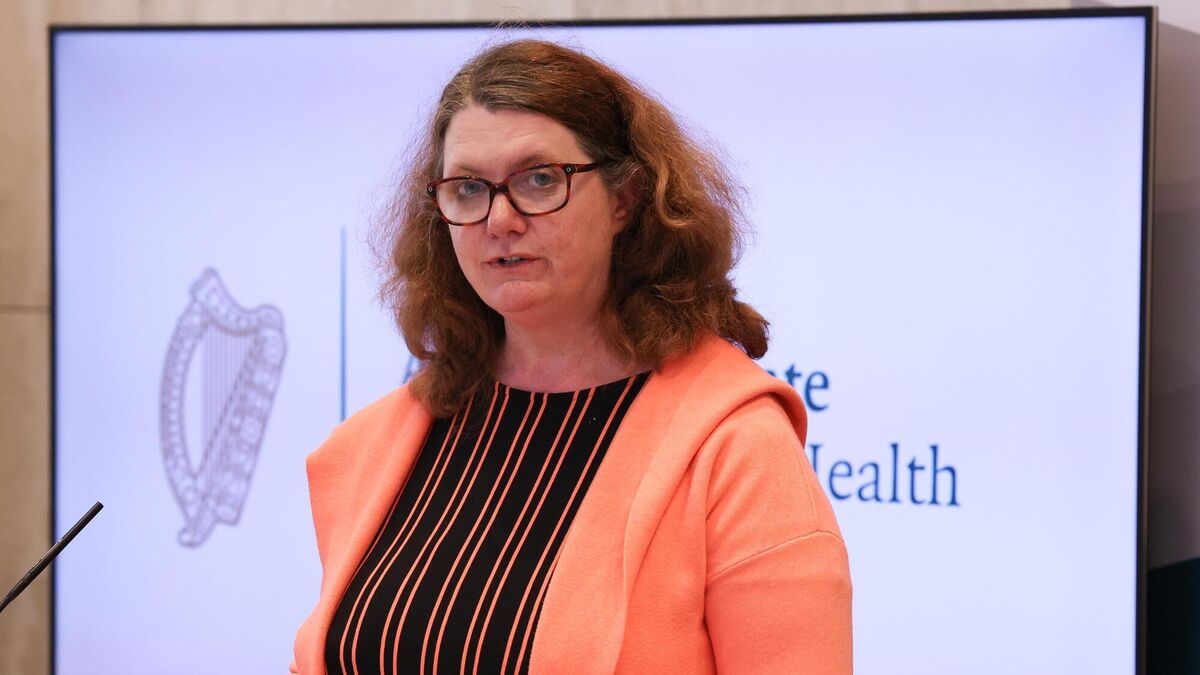We banned smoking. So why can't we get warning labels on alcohol?

Then health minister Micheál Martin in Bewley's Café, Dublin, on March 29, 2004 — the first day of the smoking ban he spearheaded. Sheila Gilheany asks why the Taoiseach's concern about smoking is not being extended to alcohol. Picture: Haydn West/PA
The Public Health (Alcohol) Act 2018 is a world-leading piece of legislation which contains a range of measures designed to work as a package to reduce alcohol consumption and curb alcohol harm.
A central component of the legislation is the inclusion of alcohol health information labelling (due to be introduced from May 2026) so the public can know some of the health risks associated with alcohol.
A driving force behind the legislation was the then health minister, now Tánaiste, Simon Harris; steadfast support also came from Taoiseach Micheál Martin.
Therefore, it was with much surprise that, nearly seven years later, the same Simon Harris announced that labelling would need to be delayed.
Such a situation leaves one wondering why the architect of alcohol labelling would perform a major political volte-face on his own policy?
The answer is simple: Pressure from the alcohol industry.
This industry is a multi-billion-euro sector with considerable capacity to shape policy through the power it wields at the highest levels of government.
This industry influence was exposed in research published in the , entitled ‘Assessing alcohol industry penetration and government safeguards’.
Of the European countries researched, Ireland was the only one to record alcohol industry penetration across all five indices analysed, including areas such as industry participation in alcohol policy formulation and government officials or politicians with current or former roles in the industry.
Indeed, in recent months, we have witnessed this influence first-hand as industry convinced a host of senior Government ministers to parrot their spurious arguments for delaying labelling.
We now have substantive evidence going back decades that the alcohol industry has sought to shape public understanding on the causes, nature, and uncertainty of alcohol-related harms in ways that protect revenue, using many of the same strategies previously employed by the tobacco industry.
A particularly egregious example of this came to light during Ireland’s notification of alcohol-labelling regulations to the European Commission.
In the engagement with the EU process, many industry submissions claimed the association between alcohol and cancer risk was complex, could not be adequately explained in a single warning label, and people couldn’t possibly understand the link by giving them public health information.

In public, the industry continuously distorted, downplayed, and otherwise obfuscated the evidence linking alcohol and cancer. In many instances, industry arguments claimed the cancer warning was inaccurate, unproven, and based on false or unsound evidence.
Suggesting that warning labels are disproportionate ignores the scientific consensus and the significant human and economic cost of alcohol harm.
Alcohol is a Group 1 carcinogen, just like tobacco, and is directly linked to liver disease and multiple cancers. The evidence linking drinking and cancer was established by the WHO’s International Agency for Research on Cancer as far back as 1988, and more recent research has only strengthened the conclusion, including for breast, liver, and colorectal and oesophageal cancers, with significant risks at even relatively low levels of consumption, one to two drinks daily.
The industry’s most recent tactic has been to claim that labelling will damage Irish exports and constitutes a barrier to trade.
However, labelling of alcohol products has nothing to do with Ireland’s exports, as the regulations only apply to products sold in Ireland.

In relation to imports, or home-produced products, the legal onus is on retailers, not producers, to ensure compliance. A store can simply add a sticker to the product.
Labelling has been scrutinised at EU level, with the European Commission ruling that the regulations do not constitute a barrier to trade or the single market, and are proportionate to the scale of alcohol issues in Ireland.
A further industry red herring has been to call for Ireland to wait for an EU-wide label in the full knowledge that there is no such proposal on the table. This is the same industry that has resisted all attempts to provide even basic labelling of contents, as is required with all other consumables in the EU.
Alcohol labels tell people the facts, that alcohol causes liver disease and cancer.
They also have a pregnancy warning graphic, while giving basic nutritional information and details of the HSE website, www.askaboutalcohol.ie.
Postponing labelling might be conscience-free for some politicians, but it is not consequence-free for the thousands harmed by alcohol.
Every day, three people are told they have cancer which has been caused by alcohol, and up to 15 babies are born with lifelong neurological harm from fetal alcohol spectrum disorders. However, most don’t know that alcohol lies behind these devastating conditions. Recent research from the HSE revealed that only 38% of people in Ireland are aware of the link between alcohol and cancer.
It is particularly unconscionable that the alcohol industry opposes labelling in relation to pregnancy.
However, such attempts are nothing new — the alcohol industry opposed the introduction of mandatory, visible pregnancy warning labelling in Australia and New Zealand for over 20 years before it finally passed in 2020.
Taoiseach Micheál Martin is rightly held in high regard, nationally and internationally, thanks to his leadership around Ireland’s smoking regulations, and he knows the power of industry lobbying, having faced it down two decades ago.
Recently, Mr Martin called for a ban on sunbeds due to their cancer risk, highlighting the value of preventive actions to reduce cancer incidence. Alcohol Action Ireland, along with more than 85 other organisations and advocates, are strongly urging the Taoiseach to resist industry lobbying once more, and proceed as planned with alcohol labelling in May 2026.
Warning labels are far from a panacea, but, at a minimum, consumers have the right to know when products cause liver disease, pose cancer risks, and can harm the unborn.
Equally, the citizens of Ireland should know that when a law goes through the long and rigorous democratic processes of the State, it will not just be discarded because the industry it seeks to regulate has undue influence.
Anything less destroys trust in our democracy.
- Sheila Gilheany is the chief executive of Alcohol Action Ireland





